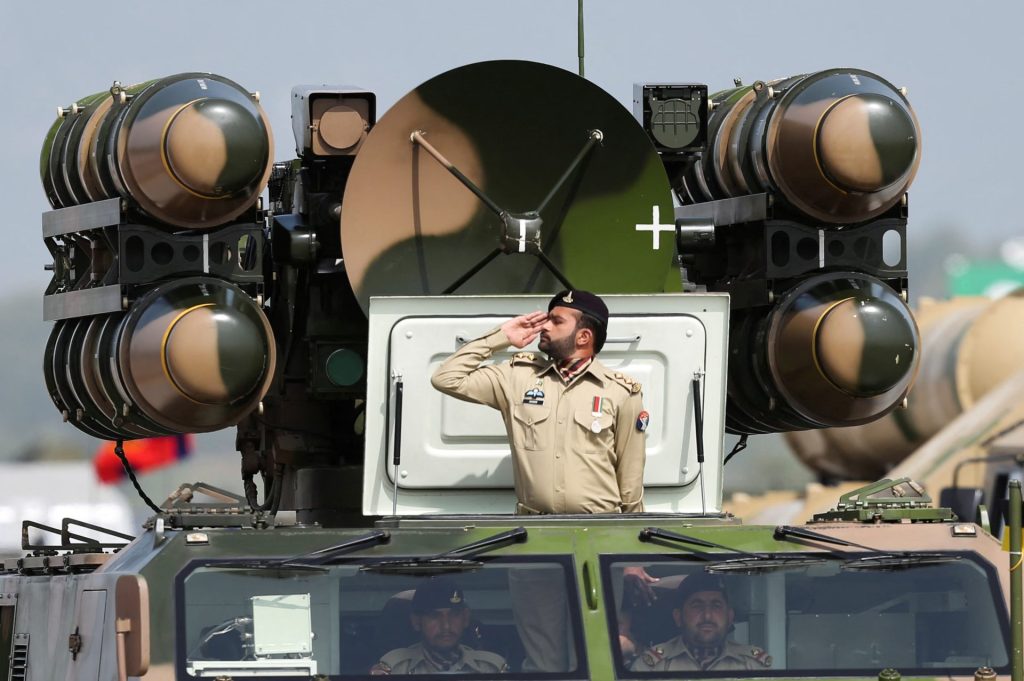The United States has recently expressed concerns over Pakistan’s advancements in its missile technology, specifically claiming that Pakistan is developing capabilities that could potentially target the U.S. mainland. This has led to heightened scrutiny of Pakistan’s strategic missile program and subsequent sanctions on key entities involved.
A senior U.S. official stated that Pakistan’s advancements in large rocket motors and missile systems could allow it to strike targets beyond South Asia, including the United States.
The official emphasized that this raises questions about Pakistan’s intentions and has prompted the U.S. to impose sanctions on four organizations linked to Pakistan’s missile program, including the National Development Complex (NDC). The U.S. accuses these entities of acquiring equipment and technology to enhance Pakistan’s missile capabilities.
The timing of these accusations coincides with growing U.S.-India strategic ties. India has long been lobbying against Pakistan’s defense capabilities and leveraging its influence in Washington to restrict Pakistan’s advancements.
Experts believe the U.S. concerns are part of a broader geopolitical strategy, aiming to contain China’s influence in the region by aligning more closely with India. This strategy creates additional pressure on Pakistan’s defense programs while simultaneously ignoring India’s aggressive military advancements.
Pakistan’s missile program is primarily designed to counter India’s growing military capabilities, particularly its advanced missile defense systems. Key developments in Pakistan’s program include Shaheen-III, a medium-range ballistic missile with a range of 2,750 kilometers, designed to target strategic locations within India, including the Andaman and Nicobar Islands.
Another is Ababeel, a missile equipped with MIRV (Multiple Independently Targetable Reentry Vehicle) technology, capable of bypassing India’s missile defense systems. It is not designed for intercontinental use but rather to maintain a credible deterrence against India’s advancements.
Contrary to U.S. claims, Pakistan has not tested missiles with ranges capable of targeting the U.S., nor does it possess intercontinental ballistic missile (ICBM) technology. Pakistan’s focus has remained on balancing India’s militarization and protecting its national security interests.
Pakistan’s strategic program is sacrosanct and essential to its sovereignty and stability. It represents a national consensus that transcends political differences, uniting the country in its commitment to safeguarding national security.
As highlighted by Pakistani leadership, the program reflects an “Absolutely Not” stance, rejecting any external intrusion or compromise on its defense capabilities.
The U.S. has imposed sanctions on entities allegedly linked to Pakistan’s missile program. These sanctions target organizations involved in acquiring technology and equipment for missile development, such as the NDC. While these sanctions may create logistical hurdles, defense experts assert that Pakistan’s missile program is largely self-reliant and designed to operate independently of foreign technology.
The sanctions, while symbolic, are unlikely to significantly impede Pakistan’s progress but serve as a political message to align with India’s strategic goals.
India’s missile advancements, including the development of ICBMs like Agni-V with ranges exceeding 5,000 kilometers, have gone largely unchecked by the international community. India’s growing arsenal includes nuclear-powered submarines capable of launching missiles from near enemy coastlines.
These developments directly threaten Pakistan’s security, compelling it to enhance its own defensive capabilities.
Additionally, India’s influence in global policymaking circles has played a significant role in shaping the narrative against Pakistan. While India has tested and operationalized technologies capable of striking far beyond its borders, these actions have been overlooked or even encouraged by its allies.
In contrast, Pakistan’s defensive measures have been disproportionately scrutinized, reflecting a biased approach that undermines regional stability.
For Pakistan, its missile program is not about offense but defense. The program ensures that Pakistan can maintain a strategic balance in South Asia and deter any potential aggression from India. With India’s rapid militarization and its inclusion in global alliances like the Quad, Pakistan cannot afford to fall behind in its defensive capabilities.
Furthermore, the narrative pushed by the U.S. aligns closely with India’s geopolitical goals, aiming to isolate Pakistan on the international stage. It is crucial for Pakistanis to understand that these developments are part of a broader strategy to weaken Pakistan’s defense infrastructure while empowering India.
Pakistan’s foreign ministry has categorically rejected the U.S. allegations and sanctions, labeling them as biased and counterproductive. The ministry emphasized that Pakistan’s strategic capabilities are solely for national defense and maintaining regional stability.
It also highlighted the double standards in international policy, where India’s aggressive militarization is ignored while Pakistan’s defensive measures are scrutinized.
The ministry further asserted that Pakistan’s missile program is indigenous and driven by the need to ensure national security. The country’s leadership remains committed to peaceful coexistence in South Asia but cannot ignore the growing threats posed by India’s expanding arsenal and aggressive posturing.
Pakistan’s strategic program also highlights the hypocrisy in international policies, as India next door possesses ballistic missiles with ranges exceeding 10,000 kilometers without facing similar scrutiny.
For Pakistanis, it is essential to recognize that the country’s missile program is a vital component of its national defense. The allegations by the U.S. should be viewed in the context of broader regional dynamics, where India’s unchecked advancements and lobbying efforts have contributed to an imbalanced narrative.
Pakistan’s focus remains on ensuring its sovereignty and safeguarding peace in South Asia, despite the challenges posed by external pressures and sanctions. By maintaining a robust defense strategy, Pakistan can continue to deter aggression and protect its national interests in an increasingly complex geopolitical environment.


